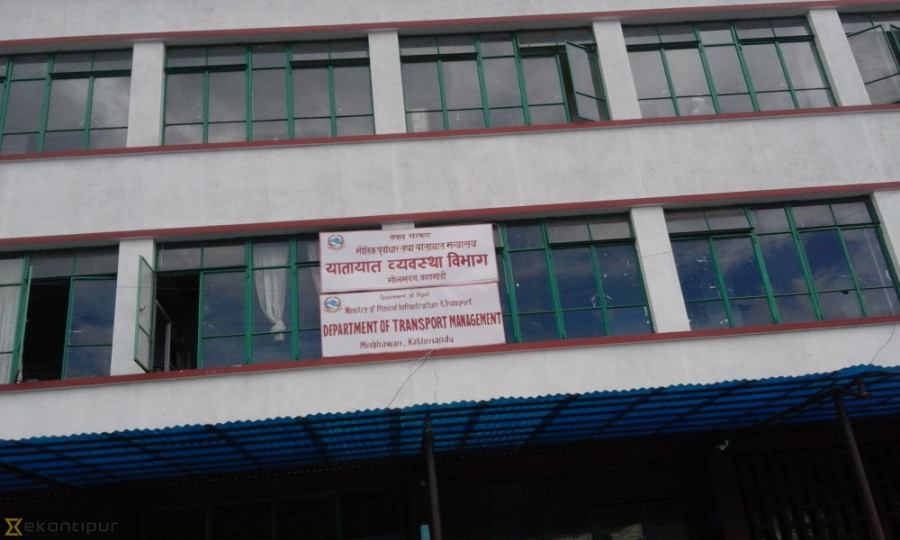Money
Agencies struggle to justify their existence with not much to do under federal set-up
The federal government has retained many agencies deemed redundant.
Prithvi Man Shrestha
Bandhu Prasad Bastola, director at the Department of Transport Management, was busy clearing a number of requests for smart driving licence when the Post reached his office on Sunday.
As the transport offices, which are now under the provincial governments, are struggling to clear several months’ worth of backlog of smart driving licence applications, the department has been facilitating the licence issuance process for the people preparing to go abroad.
“We no longer have involvement in most of the core functions related to transport management these days. Our staff here hardly have any busy day,” Bastola told the Post. “Except for printing the smart driving licence, we are hardly involved in other core functions related to transport management.”
Tasks such as registration of vehicles and their renewal, providing driving licence and their renewal, and tax collections, among other works, take place through the transport offices under the provincial governments.
“In the past, the transport offices used to seek instructions from the department on a number of issues and we used to be busy most of the time. Now, they no longer have to respond to us, and we are largely detached from most of the works,” Bastola said.
The department, being the office under separate government, has to send a letter through the Ministry of Physical Infrastructure and Transport followed by the Prime Minister’s Office and the Chief Minister’s Office for official communication with the transport offices under the provinces.
“As the department does not have major tasks related to transport management, there have been informal discussions at the ministry level about scrapping the department and overseeing the policy issues through a transport section at the ministry,” Bastola said.
The department was one of the offices considered redundant at the centre by the organisation and management survey of the government.
But the central government retained this department along with many other agencies despite the transfer of most of the authorities of such offices to the provinces and local units.
“The politicians wanted to handle large ministry, but bureaucrats didn’t want to work under the provincial and local governments. As a result, most of the departments were not scrapped,” said Bastola, who had earlier worked at the Federal Affairs and General Administration Ministry, which had conducted the organisation and management survey.
As per the schedule 5 of the constitution, the centre only has the rights related to making national transport policies. Management of the transport sector comes under the provincial government, according to schedule 6 of the constitution.
Beside facilitating for early availability of driving licence, the department is currently involved in drafting a new Transport Management Act, overseeing whether vehicles coming to Nepal are up to the standards of the country, and managing the central server of the information technology system through which transport offices across the country are working.
Along with reduced responsibility, the department’s workforce was brought down to around 40 from over 80 in the past.
The department is not the only office whose tasks have been limited. Offices like the Department of Cooperatives, Department of Forest and Soil Conservation, and Department of Women and Children also have much-reduced responsibilities.
Tok Raj Pandey, registrar at the Department of Cooperative said that his agency has a much-reduced role after the division cooperative offices were scrapped and regulatory works were handed over provinces and local levels.
“We also have a reduced number of employees,” Pandey said.
As per the government decisions, the department is only responsible for regulating the cooperatives which have operations in more than one provinces, central cooperative association, National Cooperative Bank, and National Cooperative Federation. As per schedule 9 of the constitution, cooperative comes under the concurrent jurisdictions of all three tiers of government.
However, Bhupal Baral, spokesperson at the Ministry of Federal Affairs and General Administration defended the existence of many departments which have limited jurisdiction, saying that their existence continued because they were needed at the centre.
“The government offices without any work could have been scrapped. The existing offices have a certain task, but they may have reduced role and reduced employees,” he said.
As the centre retained many offices, it failed in its mission to send most of the civil servants to work under provincial and local governments which resulted in staff shortage in these offices.




 14.24°C Kathmandu
14.24°C Kathmandu















